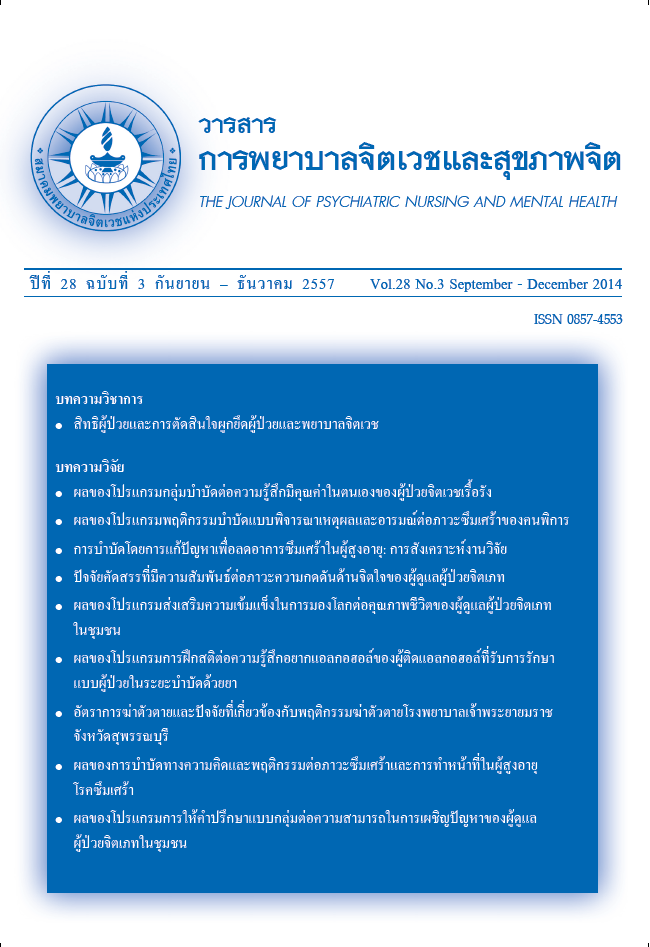ผลของโปรแกรมพฤติกรรมบำบัดแบบพิจารณาเหตุผลและอารมณ์ต่อภาวะซึมเศร้าของคนพิการ EFFECT OF A RATIONAL EMOTIVE BEHAVIOR THERAPY PROGRAM ON DEPRESSION AMONG DISABLED PERSONS
Main Article Content
บทคัดย่อ
วัตถุประสงค์: การวิจัยครั้งนี้เป็นมีวัตถุประสงค์เพื่อศึกษา ผลของโปรแกรมพฤติกรรมบำบัดแบบพิจารณาเหตุผลและอารมณ์ต่อภาวะซึมเศร้าของคนพิการ
วิธีการศึกษา: การวิจัยครั้งนี้เป็นการวิจัยกึ่งทดลอง คัดเลือกกลุ่มตัวอย่างจำนวน 20 ราย แบบเฉพาะเจาะจง แบ่งเป็นกลุ่มทดลองและกลุ่มควบคุม ทั้ง 2 กลุ่มไม่มีความแตกต่างกันในเรื่อง เพศ ระดับคะแนนภาวะซึมเศร้า และระดับการศึกษา กลุ่มทดลองได้รับโปรแกรมพฤติกรรมบำบัดแบบพิจารณาเหตุผลและอารมณ์ กลุ่มควบคุมดำเนินชีวิตตามปกติ เครื่องมือที่ใช้ในการวิจัยคือ 1) แบบบันทึกข้อมูลทั่วไป 2) แบบประเมินภาวะซึมเศร้าของเบ็ค (Beck Depression Inventory I [BDI-IA]) แปลโดย มุกดา ศรียงค์ มีค่าความเชื่อมั่นโดยใช้สัมประสิทธิ์อัลฟาของครอนบาค เท่ากับ .89 และ 3) โปรแกรมพฤติกรรมบำบัดแบบพิจารณาเหตุผลและอารมณ์ผู้วิจัยสร้างขึ้นจากการทบทวนวรรณกรรม ทดสอบความตรงตามเนื้อหาโดยผู้ทรงคุณวุฒิ 5 ท่าน ได้ค่าดัชนีความตรงตามเนื้อหาเท่ากับ 1.00 วิเคราะห์ข้อมูลโดยใช้สถิติเชิงพรรณนา ทดสอบ 2 กลุ่มที่ไม่เป็นอิสระต่อกันใช้ Wilcoxon Signed Rank Test และทดสอบ 2 กลุ่มที่เป็นอิสระต่อกันใช้ Mann-Whitney U Test
ผลการศึกษา: ผลการศึกษาพบว่า
1. หลังสิ้นสุดโปรแกรมคนพิการในกลุ่มที่ได้รับโปรแกรมพฤติกรรมบำบัดแบบพิจารณาเหตุผลและอารมณ์มีคะแนนภาวะซึมเศร้าน้อยกว่าก่อนเข้าร่วมโปรแกรมอย่างมีนัยสำคัญทางสถิติที่ระดับ .05
2. คนพิการในกลุ่มที่ได้รับโปรแกรมพฤติกรรมบำบัดแบบพิจารณาเหตุผลและอารมณ์มีคะแนนภาวะซึมเศร้าหลังสิ้นสุดโปรแกรมน้อยกว่ากลุ่มที่ดำเนินชีวิตตามปกติ อย่างมีนัยสำคัญทางสถิติที่ระดับ .05
สรุป: ผลการศึกษาแสดงให้เห็นว่า โปรแกรมพฤติกรรมบำบัดแบบพิจารณาเหตุผลและอารมณ์สามารถลดภาวะซึมเศร้าของคนพิการได้ โปรแกรมพฤติกรรมบำบัดแบบพิจารณาเหตุผลและอารมณ์จึงน่าจะเป็นทางเลือกในการบำบัดทางหนึ่งที่สามารถนำไปลดภาวะซึมเศร้าในคนพิการที่มีภาวะซึมเศร้า เพื่อส่งเสริมสุขภาพจิตและคุณภาพชีวิตของคนพิการให้ดียิ่งขึ้น
Objective: The objective of this research was to study the effect of a rational emotive behavior therapy program on depression among disabled persons.
Methods: The research was a quasi-experimental design. Twenty subjects were purposively selected and assigned into experimental and control groups. The two groups were no difference in gender, depression level, and educational level. The experimental group received a rational emotive behavior therapy program while the control group received the normal living. Research instruments were : 1) Recording Form, 2) Beck Depression Inventory I (BDI-IA) which translated to Thai version by Mukda Sriyoung, and 3) A rational emotive behavior therapy program developed by the researcher and based on literature review. The reliability of the BDI-IA obtained by using Cronbach’s coefficient was .89. The content validity of the program was confirmed by five experts and the Content Validity Index was 1.00. Data were analyzed using descriptive statistics, Wilcoxon Signed Rank Test, and Mann-Whitney U Test.
Results: The results of the study revealed that:
1. After experiment, disabled persons who received a rational emotive behavior therapy program had a significantly lower score of depression than that before, at the .05 level
2. After experiment, disabled persons who received a rational emotive behavior therapy program had a significantly lower score of depression than those of disabled persons who received the normal living, at the .05 level
Conclusion: The results of this study indicated that a rational emotive behavior therapy program can reduce depression of disabled persons. Therefore, a rational emotive behavior therapy program could be an alternative way to help reduce depression in disabled persons, and to enhanced their mental health and quality of life.
Article Details
บทความที่ได้รับการตีพิมพ์แล้ว เป็นลิขสิทธิ์ของสมาคมพยาบาลจิตเวชแห่งประเทศไทย


